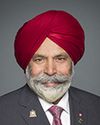This may sound a little too glib, but in 1962 in Saskatchewan when there was a province-wide doctors strike, the same argument was being advanced that some form of publicly funded system whereby the plan was delivered through doctors—basically that was the mechanism—wouldn't work, and of course it did.
When you say that it can't be done.... Not say, but when there's a hint that somehow there isn't a perfect consistency to it, I think that's probably true. Illness, treatment of illness, and drugs do vary a little bit in terms of what they deal with or don't deal with. It won't be perfect delivery of health care, and here I'd defer to the doctors who are in the room.
However, what we're trying to do here is to develop a social program, socio-economic program, health program that on balance acquires the drugs that scientists dealing with the most serious of illnesses tell us are generally effective. The doctors, knowing of this list, apply the medicines on the plan that are effective for their particular patients, and nowhere in the system is money a barrier to delivery of that program.
Will it be a completely perfect circle with no deviations and the like? Probably not, but it will certainly be one where we will remove this fast-rising component of health care costs, namely pharma costs, from the delivery of health care on the value that everybody, regardless of whether you are rich or poor or what your gender or background is, is entitled to the best possible care.



